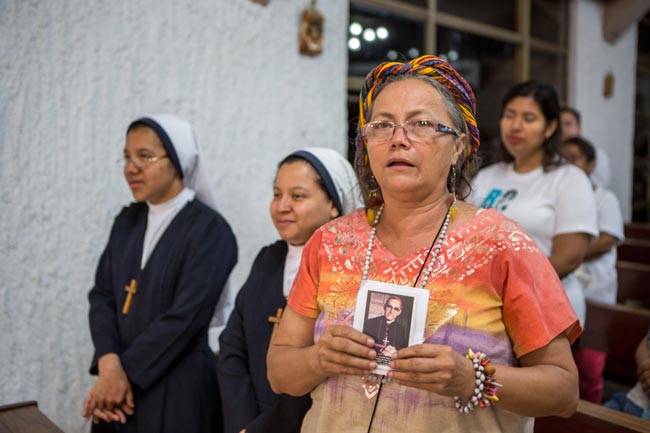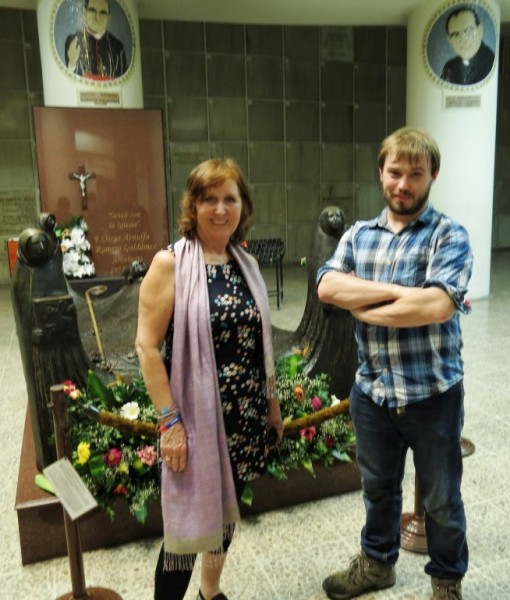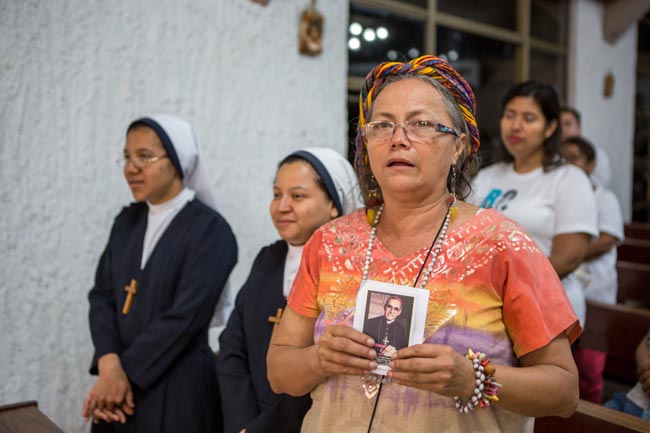Oscar Romero: Clare Dixon's reflections on his beatification

“Brothers, you are killing your fellow countrymen. No soldier has to obey an order to kill. In the name of God and in the name of the suffering people I implore you, I beg you, I order you, stop the repression!”

On 23 March 1980, Archbishop Oscar Romero called on the army in El Salvador to disobey their government and lay down their weapons. He must have suspected that by doing so he was signing his own death warrant.
About the author: Clare Dixon is Head of CAFOD’s Latin America Department and a trustee of the Romero Trust. She reflects on Archbishop Oscar Romero’s beatification today.
The next evening, Romero was celebrating a memorial Mass in San Salvador. The church doors were open and he probably noticed the car drawing up outside. An armed man climbed out, took aim and fired directly at his heart. Romero died instantly, becoming the third bishop in history to be killed in his Church, after Stanislaus of Poland and Thomas Becket.
Today’s ceremony for Romero’s beatification – declaring him “Blessed” in the eyes of the Catholic Church – will see crowds of up to half a million people gather in San Salvador, alongside at least nine Presidents and Church leaders from around the world. This recognition of Romero as a towering figure in Latin America, martyred “in odium fidei” – out of hatred for the faith – is a clear vindication of one of the great figures of the 20th Century, the moral equivalent of Martin Luther King, Nelson Mandela or Mahatma Gandhi.
Read our answers to your questions about Oscar Romero
Voice of the voiceless
In his three years at the head of the Church in El Salvador, where the military-dominated regime was propped up by the United States to combat a supposed communist threat, Archbishop Romero became the voice of the voiceless. He defended the poorer sectors of society against the violence of paramilitary death squads. His human rights office made daily rounds of the rubbish dumps in San Salvador searching for the bodies of people who’d been murdered, and they kept detailed records of the massacres carried out all around the country

- Archbishop Oscar Romero the ‘voice of the voiceless’
.Every week during his sermon from the Cathedral, Romero would recount the atrocities, and denounce the injustices of the government which persecuted the rural population. His sermons were broadcast all over El Salvador, and – in a time of heavy press censorship – they were often the only way that people knew the truth about what was taking place.
When I began working for the aid agency CAFOD in 1978, Romero was already receiving death threats, but he continued his work undeterred. On a number of occasions his radio station was dynamited, in an attempt to silence his voice. In each instance, with CAFOD’s support, he rebuilt it and carried on.
In February 1980, Romero wrote to US President Jimmy Carter:
“I ask you, if you truly want to defend human rights, to forbid military aid to the Salvadoran government; to guarantee your government will not intervene directly or indirectly, with military, economic, diplomatic, or other pressures, in determining the destiny of the Salvadoran people; I hope that your religious sentiments and your feelings for the defence of human rights will move you to accept my petition, thus avoiding greater bloodshed in this suffering country.”
A month later, he was dead. Soon afterwards, Archbishop Romero was proclaimed an unofficial saint by millions of Catholics, and he has since been venerated throughout Latin America and beyond. In 1998 the Anglican Communion honoured him as one of eight “Martyrs of the Twentieth Century” in a statue placed above the Western door of Westminster Abbey and dedicated by the Queen.
Use our resources to celebrate the beatification of Archbishop Oscar Romero.
A slow journey towards beatification
The wheels of the Vatican have turned slowly, however, and the application for Romero’s sainthood, lodged in 1991, had to wait for the arrival of Pope Francis to get the process back on track.
It is not surprising that the ultra-right-wing government of El Salvador did everything in their power to block Romero’s progress towards Sainthood. According to the United Nations Truth Commission, set up to investigate crimes committed during the civil war which was unleashed after his death, the mastermind of his murder was none other than death-squad leader and founder of the ruling ARENA party, Major Roberto D’Aubuisson – known familiarly as Blowtorch Bob after his favoured method of torture.
Little wonder then that the ARENA government tried to discredit an Archbishop who had been killed on the orders of their founder and national hero.
Today, the government of El Salvador has changed but the country is still plagued with the legacy of the civil war. It is a deeply polarised society beset by organised crime and endemic poverty, where gang warfare claims the lives of as many people as were killed annually during the civil war.
This is partly a result of failed policies originating in Washington. While the US government had poured unprecedented funds into supporting the civil war, it paid scant attention to investing in building the peace, in creating jobs and providing opportunities for the war-torn nation.
In fact, when the UN-brokered peace process brought the war to an end in 1992, the US authorities seized on the opportunity to empty its prisons of criminal “Latino” gang-members and deport them to El Salvador and neighbouring countries in Central America. Even the names of the two main gangs in El Salvador originate in Los Angeles.
Salvadorian society celebrating together
Romero’s beatification, however, is an event which has seen the mobilisation of Salvadoran society as a whole. The ceremony is taking place during the weekend of Pentecost, the feast that celebrates the unity of diverse views within the Church. It is to be hoped that today’s events will be a source of unity and reconciliation not only within El Salvador – a country named after “The Saviour” – but all across our divided world.
Read how Fidel and Julia from El Salvador are celebrating
Watch Clare talk about Romero’s beatification
[youtube https://www.youtube.com/watch?v=hnfBIamzLb8]
Reblogged this on CAFOD Plymouth's Blog and commented:
Great article by CAFOD’s inspirational head of Latin America and Caribbean Clare Dixon on Blessed Oscar Romero beatification.
Reblogged this on CAFOD Southwark.